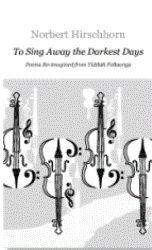Leah Fritz warms to Norbert Hirschhorn’s fresh poetic treatment of Jewish traditional songs
To Sing Away the Darkest Days:
Poems Re-Imagined from Yiddish Folksongs
by Norbert Hirschhorn
Holland Park Press, 2013
ISBN: 978-1-907320-35-4
124pp £8.99
On the first day of Rosh Hashanah, reviewing To Sing Away the Darkest Days, by Norbert Hirschhorn, is both inappropriate and appropriate: Inappropriate because the Sabbath and the High Holy Days are too sacred for orthodox Jews to do labour of any sort except praying (or maybe reading); Appropriate because thinking about Hirschhorn’s poetry, which he ‘re-imagined’ from Yiddish folk songs, on this day of all days, clearly is.
In the introduction, Hirschhorn writes that he ‘Enter[ed] into the lyrics to distill their essence – to advance, enlarge and, sometimes, subvert the original in order to create a vibrant poem in English.’ Included in the second half of the book are the folk songs which inspired him, and they are sourced, transliterated and translated. This is a scholarly project for which he collected over a thousand folksongs, sifted down to the few that he has ‘re-imagined’. Hirschhorn had known some Yiddish orally, but he had to learn to read it as it’s written in the Hebrew alphabet, and beyond that, to translate it – a huge undertaking for a public health doctor whose duties take him from England to Lebanon on a bi-monthly basis, year round.
In the first poem, ‘Basherte’, based on the folksong, ‘A Groom Without a Bride’, Hirschhorn subverts an already subversive lyric. The original song describes a wedding party out on sleds in which everyone is singing except the bride – until she sees a Polish knight go past. Suddenly she stands up excitedly. The others stop singing then, realising the marriage is never to be.
In his version, Hirshhorn, first quoting from ‘The Road Not Taken’ by Robert Frost, apparently describes his own several marriages and his one true love who was there in between and evidently still is after the marriages are over. Both the matter-of-fact presentation and the seemingly confessional content (poets frequently use the first person for fictional characters) made this reader sit up sharply. Hirschhorn, in his laid-back way, has created magic here.
Most of the other translated versions are in forms closely related to the original songs. In English, Hirschhorn’s language remains informal and even colloquial throughout. ‘Basherte‘ is also one of the few poems that appears to be autobiographical. It is clear, here and in other poems, that Hirschhorn’s identification with Judaism is from the heart and has little to do with religious orthodoxy. He cares deeply about the odd history of a family- and home-loving people who are constantly forced to move on, often following the same trades from one country to another and recognising strangers as kinsmen whatever country they have found (usually temporary) sanctuary in. The English poems add irony to the abundant irony of the Yiddish songs.
The folksong, ‘Ten Brothers’, mirrors the American ‘Ten Little Indians’ and possibly preceded it. That, in itself, is a fascinating connection. What Hirschhorn makes of it is gutsy, like a European cabaret song:
Six brothers, Yiddish-y jive, one shoved off to Belsen, the remnant was five.
Five brothers peddling schmattas door-to-door, one got mugged, leaving only four.
Four brothers stepped out to pee, one struck by lightning, now we were three.
Three brothers, deja vu, one bought the farm, down to just two.
The refrain is equally strong and bizarre: Lenin mitn fiddle, Trotsky mitn bass,/ sing a little ditty for the working class. And the last verse beginning Two brothers – engraving names in headstones – /, a final ghastly flourish.
Hirschhorn’s penultimate composition, ‘Confessions’, deriving from a 12-line folksong, is a sequence of five poems that, in a very different way – Hirschhorn’s way – reminds me of Allen Ginsberg’s ‘Kaddish.’
Norbert Hirschhorn was born in Austria, spent his childhood in New York and has crossed several continents. Marilyn Hacker, another poet from New York, has written one of her rare appreciative comments for the back of this book. It’s no surprise that I, from the same city and a similar background, also ‘dig’ his language – but then there’s the Welshman, Dannie Abse, expressing his delight in a back-page blurb.
We are all members of that diaspora – almost mishbuchah*, you might say. But these are gorgeous poems in any context, tough and daring, elegantly put together. Whatever your background, read them and sigh.
*extended family
‘Whatever Sends the Music into Time: New and Selected Poems’, published in 2012 by Salmon Poetry Ltd., Ireland, is the fifth volume of poetry by Leah Fritz. Her poems, reviews and articles have appeared in PN Review, Poetry Review, The London Magazine, Acumen and other literary publications, as well as on the internet in Eyewear, The Bow-Wow Shop and London Grip. An American ex-pat, she is also known for her writings over there.
10/09/2013 @ 15:17
What a relief to slip into something more comfortable with Leah’s introduction to the good doctor’s poems.